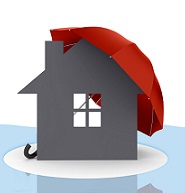Help weatherproof your home with our #FloodFacts and Preventative Plumbing Program

Utilities Kingston’s Flood Facts and Preventative Plumbing Program can help protect local homes against the risk of basement flooding associated with more frequent heavy rain events.
Canada’s climate is changing. Higher temperatures, shifting rainfall patterns and extreme weather events are expected to persist, and even intensify, over the coming decades (Natural Resources Canada).
Over the last few months and years, Utilities Kingston has received an increase in calls from Kingston residents who are worried about the impact more frequent heavy rains have on their properties. Their public education and financial assistance program can help weatherproof your home to protect against basement flooding.
Know your Flood Facts to protect your property
The number one tip that is especially relevant in spring is to check your eavestroughs and downspouts. Winter weather may have created blockages, breaks or disconnections.
In most cases, the downspout should be draining over top of the lawn, at least two metres away from your house. Consider adding an extra length of pipe. Keep your eavestroughs and downspouts clear of debris.
Other tips for spring:
- Check your sump pump for proper operation and follow the manufacturer’s maintenance recommendations. For example, you may wish to:
- Confirm it’s plugged in and working properly.
- Check for any frozen lines that need to be thawed.
- Consider an extra length of hose to increase the distance at which it discharges away from your foundation.
- Consider that in winter, if your sump pump drains to the surface, the discharge point may be buried under snow and ice. Uncover it and clear a path so the water drains away from your foundation. Otherwise, water may be recycled back into your basement.
- Check your sanitary backwater valve and maintain it according to the manufacturer’s directions. For example, if you can do so safely, you may wish to open the lid, clean it out, confirm there is a good seal in place and test its operation.
- Reduce your water use on rainy days. When it’s raining heavily the sewers may fill up. Using a lot of water during heavy rains (for example, taking a shower or doing laundry) can contribute to basement flooding and overflows to your environment. Consider using less water in extreme weather situations.
- If you know that a catch basin on your street is covered in debris and ice, please consider taking some time to clear it. This will help make sure that rainwater can enter the storm sewer and it promotes good drainage away from your neighbourhood. (Tip: you can use Google Maps with Street View to locate catch basins on your street.)
- Get 18 Flood Facts and tips to protect your property.
Know what to do if your basement has flooded. First and foremost, consider your family’s health and safety. Entering a wet basement could be hazardous! When in doubt, don’t enter the flooded area until you are told it is safe by a professional qualified to do so.
Financial assistance offered
Homeowners: get up to $3,000 through our 2023 Preventative Plumbing Program. You may use the funds to install sump pumps, backwater sanitary valves and other eligible measures, including disconnecting illegal plumbing connections.
Participants benefit from a free in-home visit that provides advice to reduce the risk of basement flooding. Interested? Visit the Preventative Plumbing Program webpage to find details and an easy-to-use online application, email or call 613-546-0000.
Did you know? Since the Preventative Plumbing Program began in 2012, $4.8 million in financial assistance has helped nearly 2,600 Kingston homeowners, including the removal of more than 260 illegal connections to the sanitary sewer.
For more information, call 613-546-0000, Monday to Friday from 8 a.m. to 4:30 p.m.